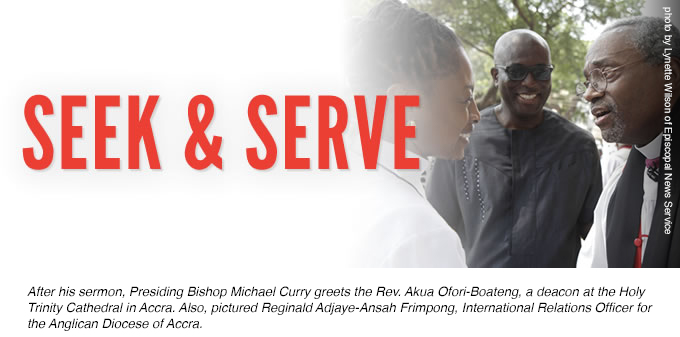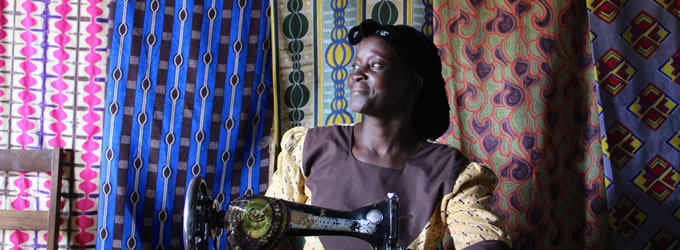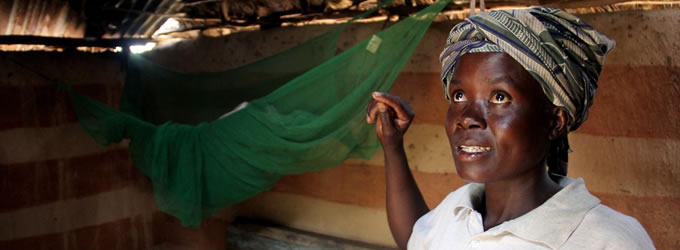|
|

|
|
|
|
Letter From The President
|
|
|
I love just about everything I do in my role as President of Episcopal Relief & Development, but nothing brings me greater joy than my travels abroad to see firsthand how our development work is making a measurable difference in people’s lives.
In January, I had the good fortune of accompanying The Most Rev. Michael B. Curry, Presiding Bishop and Honorary Chair of the Board of Episcopal Relief & Development, on a pilgrimage to Ghana. Our group consisted of bishops as well as some of Episcopal Relief & Development’s current and past board members. It was an honor to meet with our Ghanaian church partners in the northern part of the country and to witness the fruits of our asset-based community development projects – and to share this work with Bishop Curry and others on the pilgrimage. The staff of the Anglican Diocesan Development and Relief Organization (ADDRO) inspired us with stories of improved malaria control, women and children’s health, and economic development.
Later in the trip we traveled to the Cape Coast, which was an important site in the trans-Atlantic slave trade. Being there, where so many atrocities took place, was painful, but we had time to pray and reflect on the essential work of reconciliation that is required of all of us as followers of Jesus.
I’m certain that the pilgrimage was a profound and meaningful experience for all who went. I hope that as you read this issue of Seek & Serve, you are buoyed by the love and goodwill, health and opportunity that you are helping us spread in Ghana and around the world.
|
|
|

|
|
Yours faithfully,
|

|
Robert W. Radtke
President
Episcopal Relief & Development
|
|
|
|
|
|
|
|
|
|
REFLECTIONS: From the Presiding Bishop on His Pilgrimage to Ghana
|
|
I bring you Lenten greetings in the Name of our Lord Jesus Christ. From the earliest years of Christianity, faithful men and women have participated in pilgrimages to places associated with Jesus of Nazareth. In today’s world, Jesus’ ministry of healing and reconciliation is present wherever people are brought together to build up the Kingdom of God.
In January, I traveled with four bishops of The Episcopal Church and several Episcopal Relief & Development board members on a life-changing pilgrimage to Ghana. During this journey, we bore witness to the love and compassion of Christ at work in the world through Episcopal Relief & Development’s partnership with the Anglican Diocesan Development and Relief Organization (ADDRO).
After gathering in Accra and participating in a welcome Eucharist at Holy Trinity Cathedral, we departed for Bolgatanga in the Upper East Region, one of the most resource-challenged areas in the country. There, we were privileged to visit ADDRO’s impressive programs with local communities to support women’s economic empowerment, climate-smart agriculture and malaria prevention. In collaboration with Episcopal Relief & Development, ADDRO has helped distribute 9.4 million nets — a massive undertaking that is saving lives.
While in Bolgatanga, I had the pleasure of meeting Esther when we visited a project that empowers women smallholder farmers.
Esther, a mother of five, received a donkey, plow and cart three years ago.
Through credit and training, women acquire a donkey, plow and cart along with improved seeds and fertilizer. Instead of using traditional hand tools in the field, women farmers learn how to properly care for their animals and apply new farming and business techniques to help increase productivity.
Because of this innovative program, Esther sells her produce at the local market. She also earns additional income by renting out the cart to carry supplies for others in the community. These funds have made a huge difference in her life. She is now able to pay for her children to go to school. Esther told us that she couldn’t do any of this without her donkey, appropriately named, God be with her.
Our visit to the Upper East Region included a deeply moving trip to the Pikworo Slave Camp. Africans were captured from throughout the region, brought to Pikworo and detained until they were marched on foot to the Cape Coast, a distance of approximately 470 miles. Many people died both in Pikworo, where they were brutally tortured, and on the long journey. This initial encounter with the historic injustices of the slave trade shook many of us to the core.
Indeed, this pilgrimage to Ghana provided many opportunities to focus on the profound challenge of reconciliation, and to begin healing the pain and scars of the Trans-Atlantic Slave Trade. Over 12.5 million of our brothers and sisters were sold into bondage, kidnapped and transported from slave ports like the Cape Coast of Ghana — surviving the “Middle Passage” — to arrive in parts of the Caribbean and North and South America.
At the end of our week, we traveled to the Cape Coast, touring both Elmina and Cape Coast Castles. We had searing visits to the slave dungeons where dignity and humanity were violated in incomprehensible ways. In memory of the men and women torn from their homes and their families, we laid wreathes of remembrance in front of the “Door of No Return” at both sites. We sang and prayed in memory of those who came before us.
What struck me most profoundly about the visits, above and beyond bearing witness to the overwhelming human suffering, was the unholy alliance between the state, commerce and our Church.
Cape Coast Castle was a British military facility, serving the needs of European slave traders. Sitting above the men’s dungeon — sanctioning all of the brutal activities below — is an Anglican church originally established by the United Society for the Propagation of the Gospel.
The Episcopal Church is an inheritor of that legacy. As the Episcopal branch of the Jesus Movement, we have only begun to face that history and our role in it.
The local Ghanaian chiefs had placed a plaque outside the men’s dungeon. The words rang in my heart as we parted this holy place:
In everlasting memory of the anguish of our ancestors. May those who died rest in peace. May those who return find their roots. May humanity never again perpetrate such injustice against humanity. We, the living, vow to uphold this.
I am reminded of the words in 1 John 4:18 that “perfect love casts out fear.” During this Lenten season, let’s commit ourselves to following Jesus, and seeking new ways to love God and one another.
The Most Rev. Michael B. Curry is the 27th Presiding Bishop and Primate of The Episcopal Church and Ex-Officio, Honorary Chair of Episcopal Relief & Development Editor’s note: Periodically, Episcopal Relief & Development organizes pilgrimages to program sites. Past destinations have included Zambia, Ghana, Sri Lanka, Nicaragua and Myanmar. If you are interested in learning more, please send an email to pilgrimages@episcopalrelief.org.
|
|
|
|
|
|
|
|
|
|

|
|
|
|
Multiply Your Impact—Have Your Employer Match Your Gift
|
|
|
There is great joy in sharing our abundance. Your gifts to Episcopal Relief & Development enable you to put your faith into action as you promote economic opportunity and strengthen communities around the world. To multiply your impact, ask if your employer will join you in supporting this transformative work with a Corporate Matching Gift.
Our Corporate Matching Gifts program is a great way to make your contribution to Episcopal Relief & Development go even further. In fact, Corporate Matching Gifts can double, and sometimes triple, your gift. Through this match, your company can help us partner with more communities across the globe so they can reach their full potential.
Your matched support will help fund our efforts to respond to disasters with food, water, medicine and shelter ... provide longterm recovery support for communities following emergencies ... fight chronic poverty and hunger ... promote quality health care and prevent common diseases that kill millions of people each year ... protect children and build communities ... and much more.
HOW DOES IT WORK?
• Check with your company’s Human Resources department to confirm whether or not your employer matches gifts.
• If they do, request a copy of their matching gifts form and complete it following their guidelines. Mail the completed form to:
Episcopal Relief & Development ATTN: Donor Services 815 Second Avenue, 7th Floor New York, NY 10017
If you have any questions about our Corporate Matching Gifts program, please call toll free: 1.855.312.HEAL(4325).
|
|
|
|
|
|
|
|
|
|
|
|
Aiming for Universal Mosquito Net Coverage in Ghana
|
|
Last year, NetsforLife, Episcopal Relief & Development’s flagship, award-winning malaria prevention and control program, celebrated 10 years of strengthening communities to fight this deadly disease, which still kills one child every two minutes in sub-Saharan Africa.
The rural Northern and Upper West regions of Ghana have some of the highest malaria prevalence rates among children under the age of 5, and despite rapid urbanization in and around the capital of Accra, malaria remains endemic year-round.
Episcopal Relief & Development and its Ghanaian partner, the Anglican Diocesan Development and Relief Organization (ADDRO) have formed a new alliance with UK-based Against Malaria Foundation (AMF) with a goal of distributing more than 2.6 million mosquito nets in Ghana. This partnership is now active in three regions of the country – Northern, Upper West and Greater Accra – and will contribute significantly to the goal of universal net coverage throughout Ghana.
By preparing communities through education and then regularly following up after the nets are distributed, we can dramatically increase the correct and consistent use of nets, which is key in preventing malaria. With this expansion, we hope to reach nearly 1 million households.
|
|
|
|
|
|
|
|
|
|

|
|
|
|
For just $12, you can protect someone from the threat of malaria.
|
|
|
|
|
|
|
|
|
|
|
|
COUNTRY FOCUS: Ghana
|
|
Ghana, once known as the Gold Coast, is situated on the Gulf of Guinea in West Africa. In the Northern region, as many as 90% of Ghanaians work the land as smallholder farmers and rely on agriculture for their livelihoods. Yet many of these smallholder farmers experience chronic poverty and food shortages due to erratic rainfall and a short harvest season. Malnutrition and child mortality rates in this region are the highest in the country.
One of the ways Episcopal Relief & Development is working to fight hunger and increase self-sufficiency in Ghana is through an innovative program to improve productivity for women smallholder farmers. In collaboration with our partner, the Anglican Diocesan Development and Relief Organization (ADDRO), this project enables women to use donkeys, plows and carts for farm work. Donkeys are smaller and less expensive than oxen, making them easier for women to acquire and manage.
ADDRO teaches the women how to use the new labor-saving equipment and offers training in improved agricultural techniques. ADDRO also provides credit to the women so they can purchase their own donkey, plow and cart.
The benefits are many. Working the fields with donkeys, plows and carts dramatically increases the women farmers’ productivity and cuts their labor substantially. The women also use the donkey and cart for household tasks like transporting goods to and from the farm and market, and fetching water and firewood. These time savers allow for finishing work earlier in the day. In their own words: “I am able to return home from the farm early enough to cook for my children and husband to eat, we no longer eat very late in the night.”
|
|
|
|
|
|
|
|
|
|
|
PROGRAM FOCUS: Economic Empowerment in Ghana
|
|
In Ghana, as in many regions of the world, what the poorest men and women lack is not a willingness to work hard or the wish for a better life. Often what they lack are the adequate skills to earn a sustainable livelihood.
In the Bawku West District of Ghana’s Upper East Region, rural women with no education or skills struggle to support themselves and their families. In addition, prohibitively high interest rates block access to loans that might enable them to pursue income-generating activities.
Episcopal Relief & Development partners with the Anglican Diocesan Development & Relief Organization (ADDRO) to promote economic sustainability in Ghana. ADDRO has developed a food security and livelihood support program to help these rural women establish or substantially bolster their income. One successful strategy is agro-processing training, which teaches women to process raw agricultural materials to create finished products that they can use and sell at market at a higher price. For instance, shea nuts and paddy rice can be processed into shea butter.
Mrs. Anamzei Abambisida, who lives in the district, took part in the program and is now reaping the benefits. Mrs. Abambisida has no educational background, and she has supported her six children by growing and producing her own food. In 2014, she acquired two bags of shea nuts, along with training in processing, packaging, storage, and marketing.
The benefits of the program to her family have been enormous. She is now able to purchase food to supplement what she produces through farming. She was also able to register herself and her children in the national health insurance program and to pay school fees for two of her children at the senior high school. She says that she’s now able to meet a range of other needs for her six children. In her words, “This would have eluded me but for the intervention of ADDRO and its partners.”
|
|
|
|
|
|
|
|
|
|

